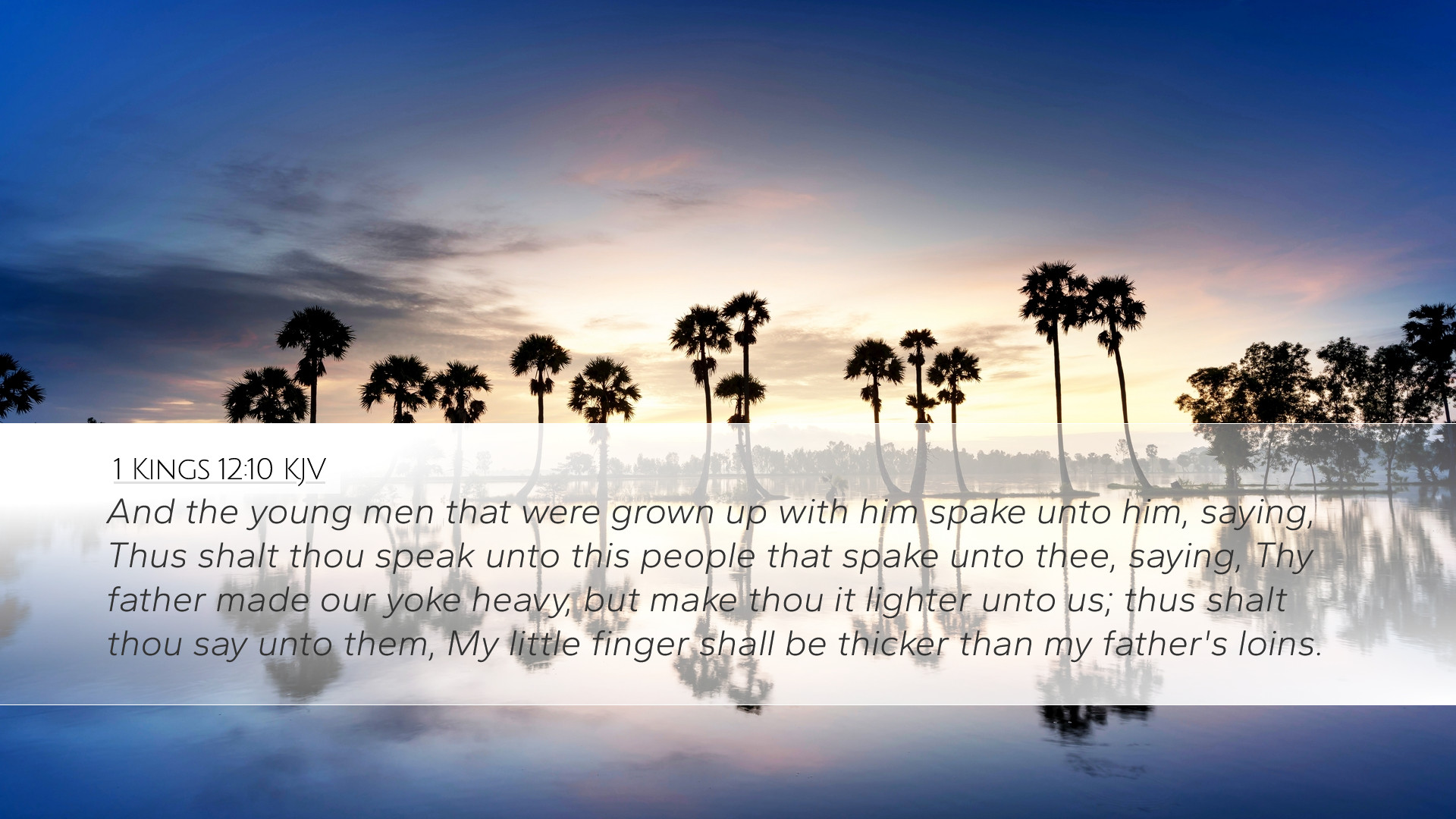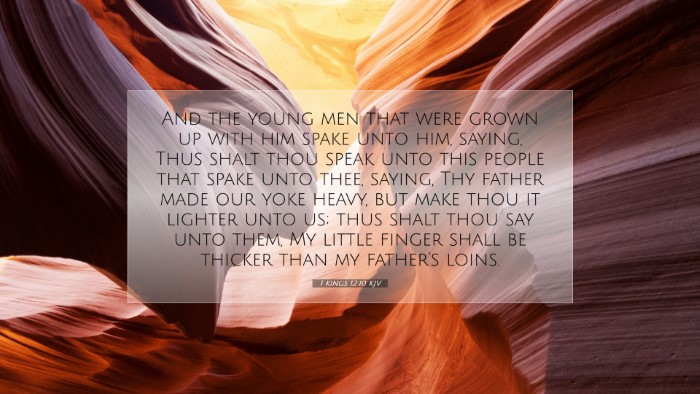Commentary on 1 Kings 12:10
Text of 1 Kings 12:10 (KJV): "And the young men that were brought up with him spake unto him, saying, 'Thus shalt thou speak unto this people that spake unto thee, saying, ‘Thy father made our yoke heavy: but make thou it lighter for us;’ thus shalt thou say unto them, ‘My little finger shall be thicker than my father's loins.'”
Introduction
This verse occurs during a pivotal moment in Israel’s history, initiating the split between the northern and southern kingdoms. It reflects a crossroads in leadership style, wisdom, and the consequences of human advice over divine guidance. The counsel given to Rehoboam highlights the themes of authority, servitude, and the sensitivities of the people under leadership.
Contextual Analysis
The context surrounding 1 Kings 12 is essential to grasping the full import of this verse. After Solomon's reign, the kingdom faced a crisis of leadership as the people approached Rehoboam seeking relief from heavy taxation and labor imposed by Solomon. Rehoboam’s response to this plight set the stage for the fragmentation of Israel.
Interpretation of Key Themes
- Advice from the Young Men: The "young men" represent a new generation of leadership. Their advice to Rehoboam is rooted in pride and a stubborn desire to assert authority without considering the wisdom of experience. This contrasts with the previous generation’s counsel.
- The Heavy Yoke: The reference to a "heavy yoke" symbolizes the burdens of taxation and labor imposed by Solomon. This plea signifies a deep dissatisfaction among the people, reflecting their longing for relief and justice.
- Rehoboam's Response: By promising to make his “little finger thicker” than his father’s loins, Rehoboam is arrogantly proclaiming his strength and determination to impose even greater demands. This response unveils his lack of empathy and insight into the needs and wishes of the populace.
Insights from Matthew Henry
Matthew Henry notes that Rehoboam's failure to seek wise counsel from those who understood the people's plight led to disastrous consequences. He emphasizes the importance of humility in leadership and how the young men’s council represents not just foolishness but a disregard for the wisdom gained through experience.
Henry points out that true leadership requires discernment and a willingness to serve others. His commentary reflects the broader biblical principle that leaders who become tyrants fail to recognize that authority comes with responsibility.
Insights from Albert Barnes
Albert Barnes elaborates on the types of counsel received by Rehoboam. He underscores the contrast between the wise men’s advice, which sought to ease the burden of the people, and the impulsive counsel of the young men, marking a significant departure from the compassionate leadership of Solomon.
Barnes interprets Rehoboam's decision to heed immature counsel as indicative of a leader swayed by pride rather than guided by wisdom. He warns readers that such decisions can lead not only to personal downfall but also to communal strife, as was exemplified by the subsequent division of the kingdom.
Insights from Adam Clarke
Adam Clarke focuses on the sociopolitical ramifications of Rehoboam's response. He suggests that the young leaders’ advice was not just evidence of their youth, but also of a misunderstanding of the people's needs and the precariousness of Rehoboam's position. Clarke indicates that righteousness and integrity can help sustain power and authority, while arrogance leads to its swift dissolution.
Clarke also highlights the spiritual implications of leadership choices. He warns that neglecting the needs of the followers can have significant repercussions, not only politically but also spiritually, as the leader moves away from the principles that govern justice and mercy.
Application for Modern Leaders
This passage serves as a vital lesson for contemporary leaders in churches, communities, and organizations. The example of Rehoboam illustrates the dangers of prioritizing ego and heedless advice over compassion and wisdom. Modern leaders should strive to:
- Seek Wise Counsel: Understanding the value of experience and discernment in decision-making.
- Practice Humility: Balancing authority with service to others, recognizing that leadership is a position of responsibility, not privilege.
- Listen to the People: Acknowledge and address the concerns and needs of those being led, fostering an environment of mutual respect and engagement.
Conclusion
1 Kings 12:10 presents a rich tapestry of leadership dynamics that speak to the heart of human nature, authority, and the consequences of our choices. The combined insights of biblical commentators underscore the need for wise leadership rooted in humility and service. It serves as a timeless reminder that the path of arrogance and disconnection from the people will inevitably lead to conflict and division, both in the biblical narrative and in contemporary society.


